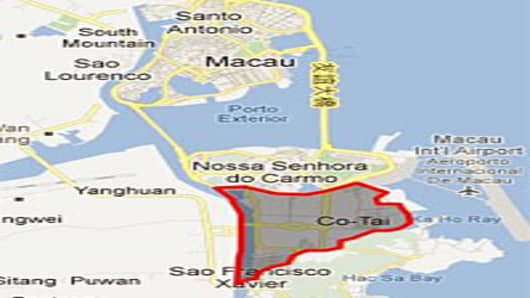Sands China’s,$4 billion integrated resort on Macau’s Cotai Strip that opens on Wednesday could help the Las Vegas headquartered firm challenge some of Asia’s biggest casino operators for leadership in the region, say gaming analysts.
“I think you could see Sands China actually challenge SJM for market share leadership. They are going to gain major market share in the mass market and gain share that they have lost in the VIP market. They are going to bring in new customers to Sands and not cannibalize customers from the Venetian,” Chad Mollman, Equity Analyst at investment research firm Morningstar, told CNBC on Wednesday.
The world’s largest integrated resort, the Sands Cotai Central — with 2 casinos and 530 tables — is expected to expand the supply of table games in Macau by 10 percent.
Sands China, the Chinese subsidiary of Sheldon Adelson’s Las Vegas Sands ,which also operates The Venetian Macao, The Sands Macao and The Plaza Macao, is the third-largest casino operator in the Chinese enclave in terms of gross gaming revenue. Casino magnate Stanley Ho’s SJM and Galaxy Entertainment Group , which runs StarWorld hotel and casino hold the number 1 and 2 spot, respectively.
Grant Govertsen, Principal Analyst at research and advisory firm Union Gaming Group, agrees that Sands China’s market share will get a boost from its Cotai Central project, adding that its other legacy properties located on the Cotai Strip will also benefit from the hype created around the new launch.
“Customers love to trial new casinos and you will see most if not all customers who come to Macau want to see the new product (Cotai Central),” Govertsen said. “(It) will also benefit some of Sands’ legacy products such as the Venetian and Four Seasons.”
As Casino operators invest billions into casino resorts on the Cotai Strip, Mollman expects gaming revenue from the Asian equivalent of the Las Vegas Strip to account for almost three-quarters of Macau’s total earnings.
“(The launch of Cotai Central) is just another step in the gradual shifting of the center of gravity from the Macau peninsula to the Cotai Strip. We see gaming revenue shifting from less than 50 percent from the Cotai Strip to over 70 percent as the decade progresses,” he said.
Discussing the timing of the launch, both Mollman and Govertsen say they are not worried about the possible impact on gaming revenues in Macau from a slowdown in China particularly because of robust demand from the mass market.
“All the indicators to date have suggested Macau is very strong on both the VIP and the mass side, but we are more excited about what’s going on in the mass market and the growth potential there which is why you are seeing Sands China open a resort with over 6,000 hotel rooms,” Goversten said.
Is it Time to Invest in LVS?
Mollman is upbeat on prospects for parent company Las Vegas Sands, which derives 85 percent of its sales from Asia,“Sands has strong growth prospects in Asia and competitive position in key markets,” he said, adding that there is also a lot of growth potential for its hotel Marina Bay Sands located in Singapore.
Share of Las Vegas Sands have risen over 35 percent since the start of the year. Overnight Invest Bank JP Morgan raised Las Vegas Sands price target to $66 from $61 with an overweight rating. The stock closed Tuesday in New York at $58.40.
Govertsen, meanwhile, is upbeat on shares of subsidiary Sands China, which have gained over 30 percent since the start of 2012.
“We like Sands China, as the company has built the perfect mousetrap with its collection of assets in Macau. No other operator will have as many wholly-owned gaming positions or hotel rooms than Sands,” Govertsen said.
“All of its properties combined will have about 25% of the table games supply in the market and about on third of the total room supply,” he added.




